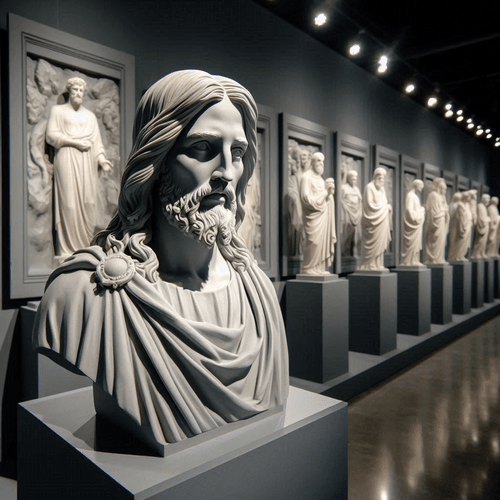Historicity Compared: Jesus and Ancient Leaders
Join us as we explore the historical evidence for Jesus of Nazareth and five other influential figures from antiquity: Julius Caesar, Socrates, Alexander the Great, Confucius, and Gautama Buddha.
Historicity Compared: By examining the written records, their proximity to each subject’s lifetime, and their reliability, we aim to provide a balanced comparison of the historical footprints left by these significant individuals. This comparison not only sheds light on the historical Jesus but also provides valuable context in understanding how we reconstruct the lives of ancient figures in general. As we navigate through time and across cultures, we’ll see how the available evidence shapes our knowledge of these iconic individuals who have profoundly influenced human history and thought.
Jesus of Nazareth (c. 4 BCE-c. 30/33 CE): Jesus’ life is documented in the four Gospels (Mark, Matthew, Luke, John), written approximately 40-70 years after his death. The Pauline Epistles, dating to 20-30 years after Jesus’ death, provide early Christian perspectives. Non-Christian sources include brief mentions by Josephus (c. 93-94 CE), Tacitus (c. 116 CE), Pliny the Younger (c. 112 CE), and Suetonius (c. 120 CE). These sources help establish Jesus’ existence, his role as a teacher, his crucifixion under Pontius Pilate, and the early spread of Christianity. The multiple independent sources, including non-Christian references, provide a strong basis for accepting Jesus’ historicity with high confidence. Additionally, archaeological findings, such as the Pilate Stone, corroborate the New Testament accounts of historical figures involved in Jesus’ life.
Julius Caesar (100-44 BCE): Caesar’s own writings, Commentarii de Bello Gallico and Commentarii de Bello Civili, offer firsthand accounts of his military campaigns. Contemporary sources include Cicero’s letters and speeches, Sallust’s Bellum Catilinae, and references in Livy’s works. Later historians such as Suetonius, Plutarch, and Appian provide comprehensive biographies. These sources, written during Caesar’s lifetime and shortly after, offer detailed insights into his military conquests, political career, and personal life. The abundance of contemporary evidence, including Caesar’s own writings, makes his historicity virtually certain. Coins minted during his lifetime and monuments such as the Julian calendar reform further solidify his historical presence.
Historicity Compared: Socrates (c. 470-399 BCE): Our knowledge of Socrates comes primarily from his students’ works: Plato’s dialogues and Xenophon’s Memorabilia, Apology, and Symposium, all written within decades of Socrates’ death. The contemporary playwright Aristophanes also depicted Socrates in The Clouds. These sources provide information about Socrates’ philosophical methods, teachings, and his trial and execution. While distinguishing the historical Socrates from his portrayal in Plato’s works can be challenging, the multiple contemporary sources strongly support Socrates’ historical existence with high certainty. The influence of Socratic thought on subsequent philosophical traditions also attests to his significant impact.
Alexander the Great (356-323 BCE): While no contemporary accounts survive, Alexander’s life is extensively documented in later works based on eyewitness reports. Key sources include histories by Diodorus Siculus (1st century BCE), Quintus Curtius Rufus (1st century CE), Arrian (2nd century CE), and Plutarch (1st-2nd century CE). These works, drawing on now-lost contemporary accounts, provide detailed narratives of Alexander’s conquests, military strategies, and personal life. Despite the lack of surviving contemporary documents, the consistency across multiple later sources based on earlier accounts establishes Alexander’s historicity with high confidence. Additionally, archaeological evidence, such as coinage and city foundations, supports the historical accounts of his expansive empire.
Historicity Compared: Confucius (551-479 BCE): The primary source for Confucius’ life and teachings is the Analects, compiled by his disciples in the decades following his death. Other classical Chinese texts such as Mencius, Xunzi, and Zuo Zhuan written within a few centuries of Confucius’ life, provide additional context. These sources offer insights into Confucius’ philosophical teachings, his life as an educator, and his influence on Chinese thought. While the Analects may idealize Confucius, the consistent portrayal across various early Chinese texts supports his historical existence with strong certainty. His enduring influence on Chinese culture and education further corroborates his historical significance.
Gautama Buddha (c. 563/480-c. 483/400 BCE): The earliest written accounts of Buddha’s life appear in the Tripitaka (Pali Canon) and various Sutras, compiled centuries after his death based on oral traditions. The earliest physical evidence mentioning Buddha comes from Ashoka’s edicts in the 3rd century BCE. These sources provide information about Buddha’s life, teachings, and the early spread of Buddhism. While the long oral tradition before written documentation introduces some uncertainty, the consistency of core elements across various Buddhist texts and the corroborating archaeological evidence from Ashoka’s time support Buddha’s historicity with reasonable confidence. Additionally, the geographical spread and influence of Buddhism from India to East Asia attest to the historical impact of his teachings.
Historicity Compared: Conclusion
While the nature and extent of evidence vary for each figure, all six individuals have substantial historical documentation supporting their existence. Caesar and Socrates benefit from contemporary or near-contemporary sources, while Jesus has multiple independent attestations within decades of his life. Alexander, despite the loss of contemporary accounts, is well-documented in later comprehensive histories. Confucius and Buddha, though their earliest written sources are more removed in time, have consistent portrayals in early texts from their respective cultures. Based on the available evidence, historians generally accept the historical existence of all these figures with high confidence, though the level of detail we can ascertain about their lives varies.
Related Reads:
Editor's Pick

GPS Without Eyes: How Ants Silently Shout Intelligent Design
Picture a leafcutter ant navigating the rainforest floor in pitch darkness, carrying a leaf fragment 50 times its body weight. [...]

Born Broken: Why Must We Affirm Original Sin?
Imagine a world where we’re born neutral—free to choose good, and without a bias toward evil. Sounds appealing… until we [...]

Does God Truly Care About My Everyday Choices?
OWe believe God created the universe. We believe He orchestrated the exodus from Egypt and raised Jesus from the dead. [...]
SUPPORT US:
Feel the Holy Spirit's gentle nudge to partner with us?
Donate Online:
Account Name: TRUTHS TO DIE FOR FOUNDATION
Account Number: 10243565459
Bank IFSC: IDFB0043391
Bank Name: IDFC FIRST BANK






